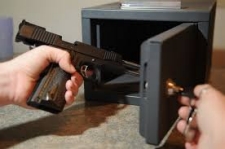Villanova Research Shows Nurses Can Be Front Line for Gun Safety of Children

Across the United States almost five million children live in homes where at least one firearm is stored unlocked and loaded. And unintentional shootings involving toddlers are on the rise: There were 58 reported cases in 2015, and 62 cases reported in 2016. Many of these cases involved a toddler who picked up an unlocked gun and then shot themselves or someone else.
To address this issue, researchers at Villanova University’s M. Louise Fitzpatrick College of Nursing surveyed pediatric nurses and nurse practitioners to assess their gun safety knowledge, health promotion strategies, and preventive interventions.
The Villanova researchers found that 70.3 percent of the sample reported asking parents about guns in the home; this question was most asked when the nurse was meeting with a new patient. Almost 88.7 percent of the nurses believe that well-child practice standards should include questions about gun safety, and 56.4 percent responded that their workplace does not have a teaching plan or policy about gun safety. Nurses who are gun owners (62.5 percent) were more likely to screen for guns and to teach about safe gun storage (75 percent) when compared to non-gun owners.
The Villanova findings are published in the article “Unintentional Gun Violence in the Home: A Survey of Pediatric Advanced Practice Nurses’ Preventive Measures”, published online in the September-October issue of the Journal of Pediatric Health Care.
“The significance of this study lies in the clarity that nursing must join the conversation about gun safety”, says Agnes N. Cho, BSN, lead author of the study, a 2018 graduate of the M. Louise Fitzpatrick College of Nursing, and a registered nurse at the Cardiothoracic Intensive Care Unit at Sandra Atlas Bass Heart Hospital at North Shore University Hospital in Manhasset, New York. “The profession of nursing can bring a unique and effective perspective to this issue, which may help to create safer homes for not only toddlers but also for individuals of all ages. Nurses must open the dialogue with parents; like anything else, guns are about safety when we talk about it.”
“Our research is one of the first studies to ask pediatric nurse practitioners who work with families about home safety and guns,” says Elizabeth Dowdell, PhD, RN, and coauthor of the study. “Unintentional gun injuries are a preventable public health concern because many of these accidents involving young children occur in the home, and nurses are in an ideal position to screen for, as well as to promote, home safety. This study supports that even without specific guidelines or protocols pediatric nurses and nurse practitioners are still screening, making assessments, and implementing safety measures to protect the public.”
The researchers note that gun injury prevention and safety is increasingly recognized as important to health across the life span. Pediatric-focused nurses and nurse practitioners have frequent contact with young children who have regular well-child visits for immunizations, growth checks, and developmental evaluations. They are in an opportune position to promote home safety specific to guns by asking about the presence of guns, providing practical counsel on safe use, and offering resources in addition to follow-up at the next meeting.
NOTE: The nurses surveyed were 54 female pediatric nurses and nurse practitioners who ranged in age from 25 to 62 years.
